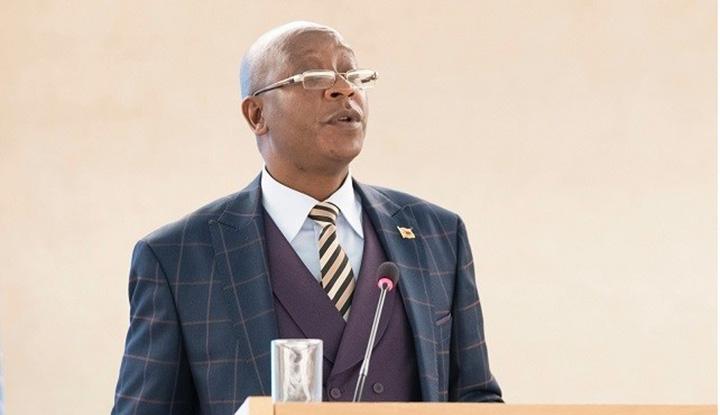News / National
ZiG devaluation amid rising gold prices raises lots of questions
18 Oct 2024 at 07:47hrs |
0 Views

Justice, Legal and Parliamentary Affairs Minister Ziyambi Ziyambi faced tough questions in Parliament on Wednesday regarding the recent devaluation of the Zimbabwe Gold currency (ZiG) despite soaring gold prices on the international market. The ZiG has plummeted to a current exchange rate of US$1.65 from US$1.99 on September 27, reflecting a significant depreciation.
Introduced in April this year, the ZiG was marketed as a stable currency backed by gold and foreign reserves. As of October 10, Reserve Bank of Zimbabwe (RBZ) Governor John Mushayavanhu reported that the currency was supported by approximately US$450 million in foreign reserves.
Mbizo legislator Cobarn Madzivanyika (Citizens Coalition for Change) raised concerns about public trust in the ZiG as a reliable store of value amid the current crisis. He highlighted the contradiction between the rising price of gold and the deteriorating value of the ZiG, questioning the government's ability to maintain confidence in the currency.
"How can people trust the ZiG as a store of value under these circumstances?" Madzivanyika asked. "With the currency losing value while gold prices are rising, what measures will you take to resolve this inconsistency?"
In response, Minister Ziyambi defended the ZiG, stating it is backed by a combination of gold, foreign currency, and other precious minerals totaling around US$400 million. He emphasized that the current amount of ZiG in circulation is about ZWG10.6 billion, and the government is aware of the currency's dynamics in the market.
Ziyambi explained, "If the government decided today to buy back the ZiG using our reserves, the rate would not exceed ZWG23.5 per US dollar." He reassured lawmakers that the government monitors its payments to ensure they align with market capacities.
However, he clarified the distinction between backing and pegging currencies, stating, "The idea that the currency was pegged to gold is incorrect. Backing involves reserves, while pegging is not allowed in our monetary policy."
The session intensified when Hwedza North legislator Itai Ndudzo (Zanu-PF) called for Finance, Economic Development, and Investment Promotion Minister Mthuli Ncube to deliver a ministerial statement addressing the alarming devaluation of the ZiG. Ndudzo pointed out the troubling reality of a gold-backed currency losing value by 44% and the urgent need for interventions to protect the livelihoods of Zimbabwean pensioners, war veterans, civil servants, and the general public who are paid in the local currency.
"Minister Ncube must explain this disequilibrium and outline the measures being implemented to safeguard the public's interests in light of this significant devaluation," Ndudzo asserted.
The ongoing discussions in Parliament highlight growing concerns over Zimbabwe's monetary policy and the stability of the ZiG, as legislators demand transparency and effective strategies to restore confidence in the national currency.
Introduced in April this year, the ZiG was marketed as a stable currency backed by gold and foreign reserves. As of October 10, Reserve Bank of Zimbabwe (RBZ) Governor John Mushayavanhu reported that the currency was supported by approximately US$450 million in foreign reserves.
Mbizo legislator Cobarn Madzivanyika (Citizens Coalition for Change) raised concerns about public trust in the ZiG as a reliable store of value amid the current crisis. He highlighted the contradiction between the rising price of gold and the deteriorating value of the ZiG, questioning the government's ability to maintain confidence in the currency.
"How can people trust the ZiG as a store of value under these circumstances?" Madzivanyika asked. "With the currency losing value while gold prices are rising, what measures will you take to resolve this inconsistency?"
In response, Minister Ziyambi defended the ZiG, stating it is backed by a combination of gold, foreign currency, and other precious minerals totaling around US$400 million. He emphasized that the current amount of ZiG in circulation is about ZWG10.6 billion, and the government is aware of the currency's dynamics in the market.
Ziyambi explained, "If the government decided today to buy back the ZiG using our reserves, the rate would not exceed ZWG23.5 per US dollar." He reassured lawmakers that the government monitors its payments to ensure they align with market capacities.
However, he clarified the distinction between backing and pegging currencies, stating, "The idea that the currency was pegged to gold is incorrect. Backing involves reserves, while pegging is not allowed in our monetary policy."
The session intensified when Hwedza North legislator Itai Ndudzo (Zanu-PF) called for Finance, Economic Development, and Investment Promotion Minister Mthuli Ncube to deliver a ministerial statement addressing the alarming devaluation of the ZiG. Ndudzo pointed out the troubling reality of a gold-backed currency losing value by 44% and the urgent need for interventions to protect the livelihoods of Zimbabwean pensioners, war veterans, civil servants, and the general public who are paid in the local currency.
"Minister Ncube must explain this disequilibrium and outline the measures being implemented to safeguard the public's interests in light of this significant devaluation," Ndudzo asserted.
The ongoing discussions in Parliament highlight growing concerns over Zimbabwe's monetary policy and the stability of the ZiG, as legislators demand transparency and effective strategies to restore confidence in the national currency.
Source - newsday
Join the discussion
Loading comments…
































